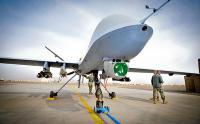-
Data show drone attacks doomed to fail against ISIS in Syria

This week, the Washington Post published a story about a new U.S. plan to use lethal drone strikes in Syria to destroy ISIS capabilities on the ground. The desire to do something — anything — to destroy the capabilities of a group so luridly destructive is understandable, but our haste to show results will likely result in a hollow victory at best. But there is a problem: there’s no evidence that drone strikes work. On the contrary, ample evidence shows drone strikes have not made Americans safer or reduced the overall level of terrorist capability. The strikes amount to little more than a waste of life, political capital, and resources. Drones cannot deliver victory over ISIS, but in any event, lacking a cohesive, articulate political strategy for governance and post-ISIS reconstruction, no military solution can produce the results we’re looking for. Lacking the political strategy, more of the same in Syria promises no better.
-
-
A first: U.K. drone strike kills Briton in Syria
British prime minister David Cameron revealed that a U.K. drone strike, which he had authorized, has targeted and killed Reyaad Khan, 21, a U.K. citizen who was a senior prominent member of Islamic State. It was the first targeted killing of a British citizen by U.K. drone. Another British citizen who was an ISIS member, Ruhul Amin, 26, was in the car carrying Khan and was also killed in the attack. Cameron said that three days later, a U.S. drone strike, carried out in coordination with the United Kingdom, killed a third British citizen — Junaid Hussain, 21. The Obama administration has said that only one American citizen, Anwar al-Awlaki, was taken out in a targeted killing.
-
-
Mighty Saber demonstrates post-nuclear detonation technical forensics capabilities
In late 2013, a team of more than fifty scientists from across the U.S. laboratory and industrial complex began preparing for Mighty Saber with the goal of demonstrating and evaluating post-detonation technical nuclear forensics capabilities following a simulated detonation of a nuclear device in an urban environment. Mighty Saber, which ran from 27 July to 21 August 2015, successfully met each of its objectives, including demonstrating U.S. government post- detonation nuclear forensics processes; the value of prompt diagnostics data provided by the Discreet Oculus ground-based sensor network; and how prompt diagnostics complements radiochemistry in providing a robust post-detonation nuclear forensics capability.
-
-
Determining the age of fingerprints
Watch the imprint of a tire track in soft mud, and it will slowly blur, the ridges of the pattern gradually flowing into the valleys. Researchers have tested the theory that a similar effect could be used to give forensic scientists something they’ve long wished for: A way to date fingerprints. Even the approximate age of a fingerprint can have a critical bearing on forensic results, as it can rule out some prints as being too old to be relevant to a crime scene. Military forensics experts would like to be able to date the multitude of fingerprints found on improvised bombs used by insurgents to winnow out prints of individuals who may simply have handled the components in a shop from those of the actual bombmakers.
-
-
What would it take to end California’s drought?
The excitement about a potentially rain-bearing El Niño is building, and hopes for a swift end to California’s ongoing drought are multiplying. At the same time, many of us who have worked extensively on water issues in the state fear the momentum and progress made on much-needed water reforms will be lost. This will be unfortunate, because California’s current water situation offers an invitation to expand how we think about water and drought conditions. A more nuanced perspective about what drought means and our water needs can help continue the momentum on the shifts, such as conservation measures and groundwater management, needed to deal with what is certainly an uncertain future.
-
-
Case closed: French judges end Yasser Arafat murder-by-radioactive-poisoning inquiry
French judges who were investigating charges by the Palestinian Authority and the widow of Yasser Arafat that he was murdered by being poisoned with radioactive material, have closed the case without bringing any charges. Arafat died in November 2004, aged 75, in Percy military hospital near Paris after developing stomach pains and exhibiting symptoms of a more general deterioration while living under Israeli siege at his partially destroyed headquarters in Ramallah. In 2012 a team of Swiss scientists found elevated levels of polonium-210 and lead-210 in tissue samples taken from his exhumed body, but French and Russian scientists who examined the same tissue samples did not find abnormal radiation levels and dismissed the Swiss findings as resulting from methodological errors.
-
-
Obama wins: Iran deal opponents cannot override Presidential veto
The Obama administration has won a major victory yesterday (Wednesday) when Senator Barbara Mikulski (D-Maryland) announced she would support the nuclear agreement reached by the P5+1 and Iran. She is the 34th Democrat supporting the accord, thus giving the administration enough votes to sustain a presidential veto of a Senate vote of disapproval. It takes sixty-seven senators to override a presidential veto, but with thirty-four Democrats now supporting the accord, opponents of the agreement can no longer reach the required veto-overriding number. It is also not clear that there will be a vote of disapproval in the Senate. To have a vote of disapproval brought the floor, the fifty-four Senate Republicans must persuade six Democrats to support cloture, that is, a motion to bring debate to an end so a vote can take place. It requires sixty senators to vote to end debate and bring a vote to the floor, and so far only two Democrats – Chuck Schumer of New York and Bob Menendez of New Jersey – have announced their opposition to the agreement, leaving opponents of the accord four votes short of a successful cloture motion. If no such vote takes place, there would be no need for a presidential veto.
-
-
Lost generation: Wars prevent 13m children in Middle East, north Africa from going to school
The UN children’s fund, in a report issued earlier today (Thursday) said that conflicts across the Middle East and North Africa have been preventing more than thirteen million children from attending school, undermining their hopes for a better future. “We’re on the verge of losing an entire generation of children in the Middle East and North Africa,” UNICEF regional director said.
-
-
Past strategies for managing droughts are obsolete in a hotter, more densely populated world

California’s current extreme drought must be a lesson for managing water in a warmer, more densely populated world, experts say. The Golden State has a long history of successfully managing droughts, but strategies from the past century are now obsolete, they assert. The current drought, which began in 2012, is a harbinger of what is to come. Engineering our way around periodic water shortages will no longer work in a hotter, drier world with ceaseless human demands on water supplies. Our ever-increasing thirst for water coupled with poor management, aging infrastructure and worsening climate change is a recipe not just for wells run dry, but for ravaged forests, extinct wildlife, and more droughts. Targeted research and public policies that move beyond a crisis response mentality are critically needed, the experts conclude.
-
-
Iran nuclear deal close to clearing last hurdle as more Senate Democrats announce support
The nuclear deal between the P5+1 and Iran is about to clear the last political obstacle to its implementation after two more Senate Democrats announced they would support the deal. Their support means that the Obama administration is just one senator short of having the required 34 votes in the Senate to sustain a presidential veto, which will follow the rejection of the deal by the Republican majority in the chamber. The president may yet not need to use the veto at all. With the growing number of Democrats coming out to support the Iran deal, there is a possibility that the Republican majority in the Senate – at fifty-four Senators — may fall short of even passing a vote of disapproval: Sixty senators would be required bring debate to a close and pass the motion of disapproval, meaning that if forty-one Democrats come out in support of the deal, the president will not have to use the veto at all.
-
-
New NGA global map advances geophysics R&D, nuclear nonproliferation
A team of researchers led by scientists at the National Geospatial-Intelligence Agency (NGA) published a new map 1 September which characterizes the Earth’s radioactivity and offers new and potential future applications for basic science research and nonproliferation efforts.
-
-
More minorities join the sovereign citizen movement

The sovereign citizen movement, the roots of which lie in white separatism and anti-Semitism, now welcomes non-white adherents. Especially susceptible to recruitment efforts by the movement are African Americans – called “Moorish Americans” or “Moorish Natives” by movement members – from poor and neglected neighborhoods.“They are much more reflective of the demographics of society today,” a former FBI case manager notes.
-
-
Terrorist attacks involving firearms cause more fatalities than attacks using explosives
New background report examines use of firearms in terrorist attacks. The report finds that even though the use of explosives has the potential to cause exceptionally high numbers of casualties, in general, attacks involving firearms were more likely to be lethal.
-
-
Members of right-wing militia go to jail for plotting attacks on U.S. infrastructure
Three members of a right-wing militia have been sentenced to twelve years in prison for conspiring to use weapons of mass destruction in attacks against federal government agencies. The defendants planned to attack critical infrastructure in Georgia while motivating militia groups in other states to rise up and join them in removing government officials who they believed had exceeded their Constitutional power. The militia members planned on starting a revolution against the federal government by conducting an attack aimed at the infrastructure supporting the TSA, DHS, and FEMA.
-
-
Chad executes 10 Boko Haram members
Chad said it has executed ten members of Boko Haram by firing squad, marking the first use of the death penalty since 2003. The ten men were sentenced to death on Friday after a court convicted them of crimes which included murder and the use of explosives. Chad officials said that one of those executed was Bahna Fanaye, alias Mahamat Moustapha, described by the Chadian officials as a leader of the Nigeria-based group.
-
More headlines
The long view
What Does Netflix’s Drama “Adolescence” Tell Us About Incels and the Manosphere?
While Netflix’s psychological crime drama ‘Adolescence’ is a work of fiction, its themes offer insight into the very real and troubling rise of the incel and manosphere culture online.
A Shining Star in a Contentious Legacy: Could Marty Makary Be the Saving Grace of a Divisive Presidency?
While much of the Trump administration has sparked controversy, the FDA’s consumer-first reforms may be remembered as its brightest legacy. From AI-driven drug reviews to bans on artificial dyes, the FDA’s agenda resonates with the public in ways few Trump-era policies have.
The Center Can Hold — States’ Rights and Local Privilege in a Climate of Federal Overreach
As American institutions weather the storms of executive disruption, legal ambiguity, and polarized governance, we must reexamine what it means for “the center” to hold.
How to Reverse Nation’s Declining Birth Rate
Health experts urge policies that buoy families: lower living costs, affordable childcare, help for older parents who want more kids
Foundation for U.S. Breakthroughs Feels Shakier to Researchers
With each dollar of its grants, the National Institutes of Health —the world’s largest funder of biomedical research —generates, on average, $2.56 worth of economic activity across all 50 states. NIH grants also support more than 400,000 U.S. jobs, and have been a central force in establishing the country’s dominance in medical research. Waves of funding cuts and grant terminations under the second Trump administration are a threat to the U.S. status as driver of scientific progress, and to the nation’s economy.
The True Cost of Abandoning Science
“We now face a choice: to remain at the vanguard of scientific inquiry through sound investment, or to cede our leadership and watch others answer the big questions that have confounded humanity for millennia —and reap the rewards.”
